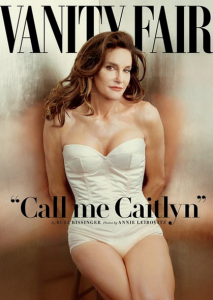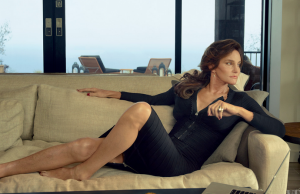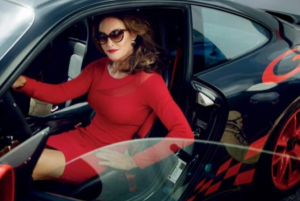Caitlyn Jenner‘s photos were published in Vanity Fair earlier this week, as we all know by now. She looks beautiful in them, and I wish her only happiness in her life as the woman she has always felt herself to be.
Since she seems to have taken charge of all aspects of publicizing her transition from Bruce to Caitlyn, we must assume that Ms. Jenner had the final say regarding which of the photos taken by top celebrity portraitist Annie Leibovitz she wanted to have featured on the Vanity Fair cover. Of all the photos from that spread, the one on the cover shows Ms. Jenner in the most vulnerable possible state: sitting in white underwear with arms pinned behind her and her strong, beautiful legs awkwardly pressed together. All the others show her looking more in-charge and comfortable with herself, not to mention in prettier clothes. For example, here she is relaxing:
Here she is about to drive her $180,000 sports car:
In each of these images, she shows herself to be in command of the moment and of herself. In one, she looks away from the camera as if unaware and unconcerned about its gaze; in the other she wears sunglasses and a body-conscious red dress, and she exudes power and control. Compare these to the cover image in which her wrists and ankles could be bound for all we know; they’re certainly pulled tightly back and out of the way, and she looks directly at the camera, unsmiling and very aware that she is being appraised by the viewer in her half-naked state.
After a lifetime of being lauded for physical strength and power, which were so often conflated with her appearing to many to be the epitome of manly attractiveness, it is understandable, but I think a bit disturbing, that she and Vanity Fair should see the opposite—a physical position of seeming powerlessness—as the apotheosis of feminine beauty. While it is true that stripping away clothes could also be taken as a symbol of stripping away what she felt were the public lies about her private self, both she and photographer Annie Leibovitz knew full well that by portraying her without clothes or visible hands or feet they were also using visual shorthand to get across the idea of her vulnerability as part and parcel of her newly-public femininity.
She is in fabulous physical condition, as one would expect a disciplined gold-medal-winning Olympic decathlete to be, and one can understand that she might want to show that off—it must feel great to show the world that she can look so conventionally attractive as a woman. And, of course, Vanity Fair wants to sex up the cover as much as possible to sell more issues. But I wonder: did Ms. Jenner or Vanity Fair think that placing her in as vulnerable a state as possible was a necessary part of making her look most feminine?
If people think that what makes Ms. Jenner appear to be “feminine” is the fact that her near nudity and constrained pose leave her looking vulnerable and fragile, that saddens me, since in that case the choice is clearly not about glamour (which can be strong and empowering) per se; it is instead about playing up weakness as a womanly trait. Caitlyn Jenner is plenty glamorous in all the photos, so the choice must have involved what she and Vanity Fair think makes her look most like a woman, and that appears to be weakness, vulnerability and the impression of greater sexual availability (i.e., fewer clothes, direct gaze, body seated rather than standing and legs and arms out of the way). I’m concerned about underlying sexist and disempowering messages about femininity and beauty that could be sent to the world by this photo spread when the most fragile and powerless-looking of all photos taken becomes the image chosen to symbolize feminine beauty out of all the beautiful, powerful images available.
I am not denigrating Caitlyn’s choice to transition from male to female, nor her desire to share her story and her first photos of herself in a beautiful and powerful way. I support and applaud her in this. I am merely questioning what this episode in popular culture tells us about how we may conflate powerlessness and vulnerability with ideals of female beauty.



